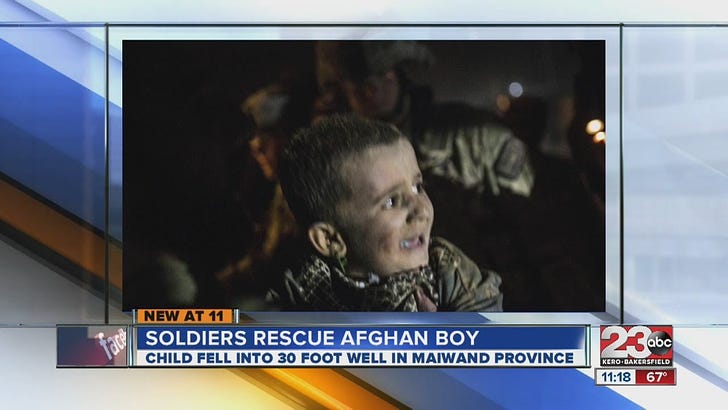I wasn’t worried at first.
After two hours, it still seemed manageable, routine even. But as the fourth hour dragged on, a faint thread of fear began to weave its way through my thoughts.
By the fifth hour, he stopped responding.
That creeping fear twisted tighter, threatening to break into full-blown panic.
When Afghan villagers asked for my platoon’s help rescuing a boy who had fallen into a well, I assumed it would be straightforward. A simple job: rappel down, grab the kid, pull him up, and then maybe share a meal of rice and goat with the villagers under the desert sky. How hard could it be?
But as soon as we arrived, I knew we were in for something much more complicated.
In the U.S., a well brings to mind an idyllic, brick-lined shaft—something you’d find on an old farm. But here in Afghanistan, it was a narrow, 20-inch-wide hole in the middle of the desert. Just enough room to drop a pump hose down. And this well was deep. Deeper than I’d expected.
The boy was so far down, we could barely make him out—thirty feet or more below the surface. My mind raced. How in the hell were we going to get him out? He was too young, maybe three years old, to grab a rope, and our linguist couldn’t get through to him. But even without understanding Pashtun, I could hear the terror in his small voice.
This wasn’t something I’d been trained for. I was here to fight the Taliban, not to rescue kids from wells. After an hour of trying to hoist him up with a rope, we started brainstorming other ways. Maybe we could dig a parallel hole, then tunnel across? I radioed headquarters, hoping the Afghan contractors nearby could bring some equipment.
But all they had was a bulldozer, and we needed to dig thirty feet down. Still, we put the dozer to work, far enough from the well to avoid a collapse. It was slow going. And it wasn’t working.
The only thing we could do was keep the boy awake and engaged. We lowered water and some snacks to him, desperate to keep him talking.
As night fell, the villagers approached my translator. "Just lower a loop around his neck," they said.
I blinked, shocked. "We don't know how stuck he is. We might kill him if we try to pull him out that way."
The elder’s response was chillingly indifferent: "It’s fine. He has brothers. We just need his body so we can bury him."
I stood there, trying to process their casual acceptance of the boy’s potential death. They were ready to write him off, but I wasn’t. I nodded mechanically. "Let me think about it."
I retreated to the back of my Stryker, mind spinning. Headquarters kept pressing for updates, but what could I say? "We’re doing everything we can. But he’s deep, he’s stuck, and this is harder than you think."
I had nothing left. Returning to the well, I found my soldiers and the interpreter peering into the void. "How’s he doing?" I asked.
"He’s stopped responding, sir. We think he’s asleep," one of my men said.
“It’s alright,” I replied, though I didn’t believe it. "We’re going to get him out."
Inside, doubt clawed at me. I was twenty-two, leading a platoon in a warzone, more at ease dodging IEDs than saving a trapped child. I’d been through Ranger School, but nothing prepared me for the crushing responsibility of this moment—of a life hanging in the balance. I picked up the radio, ready to send another bleak update to HQ.
And then, suddenly, cheers erupted.
I whipped around to see the silhouette of a small boy being pulled from the well, bathed in the harsh glow of our floodlights. The villagers melted back into the shadows, returning to their homes, the ordeal over.
My platoon sergeant strolled up to the Stryker, lighting a cigarette. "How did you do it?" I asked, stunned.
He took a drag, exhaling a cloud of menthol smoke before answering. "I tied a sliding knot with some 550 cord, poured water down the well to wake him up, then told him to put the loop on like a bracelet. Kid knew what a bracelet was, thank God. He slipped it on, and we yanked his little ass out of there."
Relief hit me like a wave. The boy was safe. Against all odds, we’d done it.
Here was a TV Report:
But not all Afghan children are as lucky:
https://www.cbsnews.com/news/boy-trapped-well-afghanistan-three-days/#:~:text=A%20five-year-old%20boy%20trapped%20for%20three%20days%20down,250%20miles%20southwest%20of%20the%20capital%20of%20Kabul.





One of my proudest moments, not only as your mother, but perhaps even more so as an American. Our military does so much more than we realize. I was so thankful for a positive story— they ao rarely get told.
That's a wild story, well done.